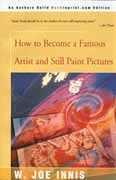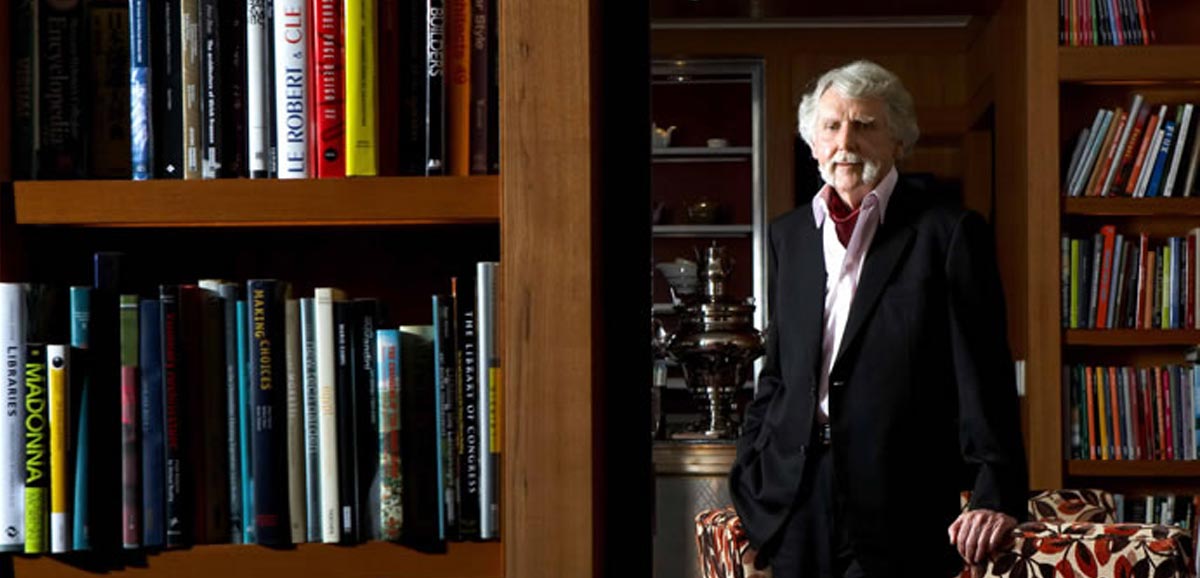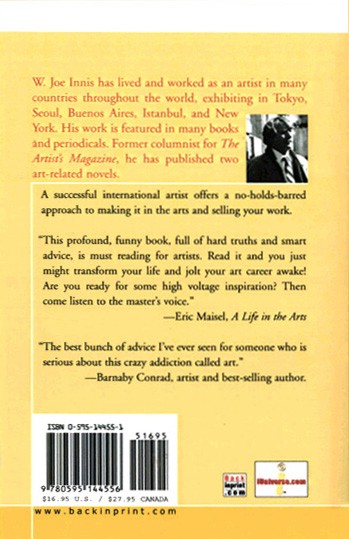What Critics and Artists Are Saying
"Joe Innis's book is the best bunch of advice I've ever seen for someone who is serious about this crazy addiction called art."
— Barnaby Conrad
artist and best-selling author,
Matador, Hemingway's Spain
"This is arguably the most revealing book on the business side of the arts. And, yes, Innis is a damned good writer . . . the sort of writer you'd like to have a drink with. And that says a lot in these crazy-artist days."
— The Book Reader
"One of the best 'How-To' books I've come across in awhile. Honest, straight- forward and witty . . . a refreshing breath of air in a world stifled by artspeak."
— Art Times
"Controversial? Perhaps. Fascinating? Without a doubt."
— Charles Olivares
San Antonio Vision
". . . W. Joe Innis is the head cheerleader for a new perspective on what we call artistic expression."
— Judyth Rigler
San Antonio Express-News
"While anyone who enjoys good writing will find the book entertaining, it is written for the serious painter. This is not necessarily the same as a full-time professional artist, but Innis will tell you how to make the jump . . ."
— Paul Cardwell, Jr.
The Paris News
Review by Steve Sherman for eBook Reviews Weekly:
Do you want to become a famous painter? Here's your guide from someone who has done it. This down to earth book is filled with tips, instruction and counsel based on years of experience (and lots of painfully wasted time, money, effort and passion). But, this is no paint by the numbers, connect the dots kit. "How to Become a Famous Artist and Still Paint Pictures" is for serious painters only! Do you have the talent? Are you selfish enough? Can you focus to the exclusion of almost everything else in your life? If so, this book will teach you how to soar in a business crowded with pigeons. If not, you can still indulge your fantasies of donning the stained smock of a famous painter by reading this book.
. . . I've never been a painter, nor do I aspire to be one. I felt a bit like an intruder, lacking the commitment needed to become a successful painter. Yet, there is still something to be learned here. I have known several wonderful painters, none famous for painting. But, all are interesting people to me. Peering inside the mind of an artist is always fascinating. I found, however, that I could relate to general concepts in the ebook through my experience with other art forms.
At the first stroke, the author points out that being a famous and successful painter is not the same as being happy. This may come as a revelation to some. But, I found this endearing, having also found (brief) fame to be surprisingly lonely, tentative and unfulfilling.
As an engineer, I like models for life. The Pigeon Factors throughout the book are just such models. "If you're serious, you must break from the flock. You must do what pigeons don't ..." With Pigeon Factors, the author draws parallels between those in the art world and pigeons, both of which the author has intimate knowledge. "You can't be an artist without also leading the life of one." I often remind my son (the budding rock star) that you can't make much money doing what others are willing to do for free. As the author points out, not only is there competition in creating good art, there is also competition in getting the rewards for creating good art. This makes a successful career in painting even more difficult.
Do you want to learn so you can teach? This presents the same problem with only marginally better career potential. But, if you choose this kind of career anyway, there seems to be some good advice here. Are you selfish enough and focused enough to do what you must to succeed? Are you willing to give up family and a generally happy albeit mundane life? The author recommends a couple of days of uninterrupted, concentrated thought about the decision to become a famous painter. Prepare to be alone. Yikes! Anyway, if you are a duck, then be a duck and not a pigeon. The author goes on to tell you how.
Work hard to get the basics down. We're talking about getting an education, not a degree. Learn to draw. I was once asked to pose nude for a drawing class. The woman who asked me was a fellow employee, a gorgeous, intelligent, wonderful blonde with stunning blue eyes. I turned it down because it seemed, um, kind of inappropriate for someone saving money to go on a mission for his church! But, the author says drawing nudes is "the single most sexless thing you've ever done." All these years I felt flattered about the invitation. Now, I feel a little, you know, naked or something. Anyway, you have to work hard and get dirty to succeed.
It seems most people who pay for art don't know art. Most people who get other people and governments to pay for art are actors. Many such successful actors are in The Fraternity. Not in The Fraternity? Get a degree and you might get in. Or, you might not. It's an exclusive club. The Fraternity is about money and art. Well, mostly it's about money while "much of the good stuff gets smothered in chic." The artist is "furniture, a stage prop." Still, to be a good artist, you need to be a good actor. So, the author offers tips on how to be a good actor as well.
There is some respect for teachers of art basics. But, the author frequently criticizes teachers who attempt to teach what cannot be taught. One cannot be taught to be a true artist. "Stay away from universities and their degree programs in studio arts." The school library and studio are, however, quite useful. The author offers tips on developing a critical eye and appreciation for prior art. I enjoyed reading about some of the lore of the painting world. He helps you develop some sense of who and what to believe or dismiss.
There are lots of tips from experience about your choice of medium, setting up your studio, maintaining truth in your art and more. For example, do acrylics. Watercolors are too difficult and the reward is minimal. Oils are too fragile. I'm not a painter, but the tips seem to make sense to me. As far as tips on how to get along with family and such, you have to divide your life. Everything is basically second to your art, but it is second. Or maybe third. You have to think of yourself as divided between artist and peddler.
Want to make money with your art? Sell directly and avoid government support. "Bad work needs support so those producing it can continue." A fellow music composer once offered me a definition of success that I rather like. To her, a successful composer is one whose music is heard and appreciated by an audience. There is a lot of government support for music compositions that are unappreciated and virtually never heard. Similarly, one must determine how to measure success for a painter. Money is a good measure. But, government money may be a tainted measure. After all, it's basis is the art of politics.
The author patiently describes how to sell your work without selling out. Telling you what won't work is alone probably well worth the cost of the hardcover version of the book. He introduces you to your buyers, the only real authorities on what your paintings are worth. Again, there are plenty of tips based on experience. He tells you who your buyers are, where they are and how to "present" (not "sell") your work to them. Eventually, you even learn how to become famous. Here's a clue about becoming famous: plan on traveling a lot. In fact, plan on living abroad for awhile. That is, if you really do want to be a famous painter! As a reward and perhaps for inspiration, the author also gives you a peek into the life of a famous painter, including how to count the money without drawing snickers from your patrons!
So, do you still want to be a famous painter? If so, then you can start your happy career by reading this book! If not, then reading this book may help you happily understand and appreciate what you are missing!
— eBook Reviews Weekly
"I bought your book this past weekend - got hooked. . . until now, I have not read or heard any suggestions/plans that have been more convincing . . . Thank You."
— Matt Davey
Indiana
"Thank you for sharing your personal experiences with the rest of us struggling artists . . . Thanks Again!"
— Linda Murray
Maine
"I have just finished your book, How to Become a Famous Artist, and I must say I was very impressed . . . You have given me a path and new hope."
— Michael Shoeder
Austin
"I bought your book, How To Become a Famous Artist, and admire your viewpoint on the ‘art establishment'. . . .I'm schooling myself . . . fascinated
with the ideas in your book."
— Ellie Clemens
"This is what I wanted to hear. The information in your book has finally calmed my fears of educational inadequacy . . . I've been taught to be honest and tell the truth my whole life and I appreciate this advice you've chosen to share with others."
— Sandra Meier
Ohio
"Mr. Innis is commendably direct, folksy, down to earth and warmly supportive of anyone who wants to learn to "see" reality more clearly . . ."
— Nick De Marco
New York
"I am grateful . . . for your willingness to state what I think is ‘Truth,' and for holding onto it while the storm of ‘popular' art passes over us."
— Penelope Price
"Really a steering-in-the-right-direction! Well worth the price . . ."
— Lin Whitman
California
"After reading the article in (The Artist's Magazine, April issue) I couldn't hold back any longer without a comment. This guy knows what is in my head."
— Barbara Trethewey
Maine
"This Speaking of Art ( The Artist's Magazine column by W. Joe Innis) really spoke to me. I had all those same experiences . . . after twenty-nine years of ups and downs. I hung up my brushes. I'm on my way to paint as I write this. . .Thanks so much."
— Julia Morrill
Minnesota
"I appreciate your candor and sage comments. You provoke much thought and self evaluation. Both are healthy . . . actually seeing the words in print helps me to create some focus."
— Ed Wolff
Montana
"Honesty IS in short supply in our field' . . . is an accurate statement, and honesty followed up with succinct, powerful, concrete solutions to the problems is in even shorter supply . . . you have addressed/provided both."
— L. Diane Johnson, PSA
|








